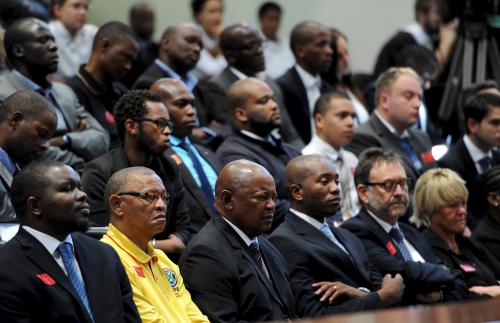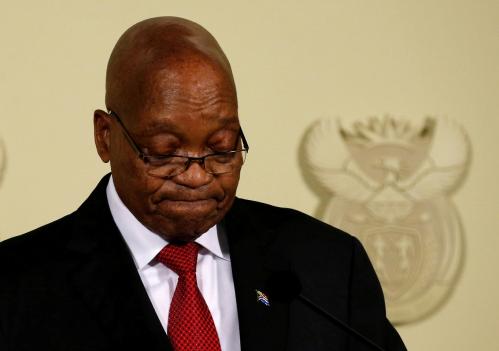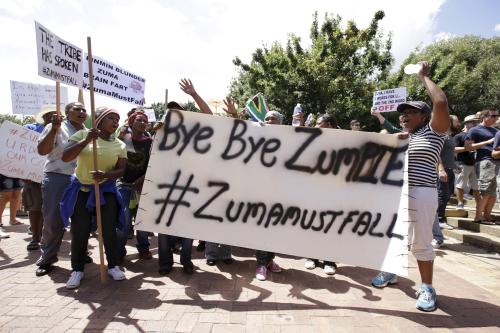South Africa’s rand plummets over Finance Minister Pravin Gordhan’s dismissal
On Monday, President Jacob Zuma recalled Finance Minister Pravin Gordhan from an investor roadshow in London. Zuma’s order prompted some speculation that he intended to dismiss Gordhan due to their ongoing political clashes over fiscal discipline, public spending, and patronage. According to Bloomberg, Zuma met with six senior African National Congress (ANC) officials that day to discuss sacking Gordhan, with three of the six leaders reportedly protesting the move. The rand, in turn, declined by 3 percent against the U.S. dollar on Tuesday as investors grew concerned about a potential cabinet reshuffle. Upon Gordhan’s return to South Africa, however, he reported that he was still the country’s finance minister, which eased investor concerns somewhat and helped the currency rebound slightly.
Yet, late Thursday night, Zuma reshuffled his cabinet, firing Gordhan based on an intelligence report that he was allegedly plotting to undermine the government. His replacement will be former Home Affairs Minister Malusi Gigaba. Zuma fired 10 ministers and 10 deputies in the reshuffle, including Gordhan’s deputy Mcebisi Jonas, Tourism Minister Derek Hanekom, Transport Minister Dipuo Peters, and Public Service and Administration Minister Ngoako Ramatlhodi. Gordhan responded to the decision, stating that the report Zuma used to justify his dismissal was “absolute nonsense” and “not the basis on which you fire a minister.” The rand extended its losses against the dollar on Thursday, falling 7 percent in the four days following Gordhan’s recall from London. This slump echoed a similar drop experienced in December 2015 when Zuma unpredictably dismissed then-Finance Minister Nhlanhla Nene.
Militia violence grows in the DRC as two UN investigators killed
On Thursday, the United Nations confirmed the murders of two of its human rights investigators, American Michael Sharp and Swede Zaida Catalan, and their interpreter, Betu Tshintela, in Kasaï-Central province, a hotbed of growing instability and violence in the Democratic Republic of the Congo (DRC). Human Rights Watch has noted that these are the first U.N. expert disappearances in the DRC and that their Congolese motorbike drivers remain missing. Sharp and Catalan, who went missing on March 12, were investigating the increase in “large-scale violence and alleged human rights violations by the Congolese army and local militia groups.” Four hundred people have been killed in the region since last year, and over 200,000 displaced.
The discovery comes only days after the government’s announcement of a militia’s ambush and decapitation of over 40 police officers in Kasaï-Central province. According to Reuters, the Kamunia Nsapu militants stole arms and vehicles, but also released six officers because they spoke the local Tshiluba language.
The country continues to face instability as President Joseph Kabila, whose term ended late last year, refuses to step down from power, citing the financial inability to conduct proper elections. According to the BBC, the details of last year’s power-sharing agreement have proved “tricky,” and mediators have called off talks, with the mediating bishops claiming that the “politicians were acting selfishly.” Demonstrations throughout the country continue and have often turned violent.
On Wednesday, U.S. ambassador to the United Nations, Nikki Haley, delivered strong words towards the DRC, saying, “The U.N. is aiding a government that is inflicting predatory behavior against its own people. We should have the decency and common sense to end this.” As the $1.2 million U.N. peacekeeping mission mandate in the DRC expires on Friday, the U.S. is pushing for a downgrade by 25 percent.
Côte d’Ivoire seeks additional IMF funding to support 2017 budget
This week, the Ivorian government voiced its intent to seek additional assistance from the International Monetary Fund (IMF) with the aim to support its 2017 budget, amid the apparition of new budget constraints. These were partly created by the drop in cocoa prices, which has greatly affected Côte d’Ivoire, as cocoa beans make up 29 percent of the country’s exports. The country will officially submit the request to IMF representatives during a visit next month, when the credit facility agreement will be reviewed.
This ask follows events last October, when the International Monetary Fund (IMF) and Côte d’Ivoire reached a staff-level agreement on a three-year $674.3 million program. Approved in December by the IMF’s executive board, the program is directed toward addressing the country’s unbalanced balance of payments, promoting inclusive growth, and achieving poverty reduction through investments in infrastructure. In return, the country committed to reforming public banks and containing fiscal risks from public enterprises.
The Brookings Institution is committed to quality, independence, and impact.
We are supported by a diverse array of funders. In line with our values and policies, each Brookings publication represents the sole views of its author(s).







Commentary
Africa in the news: Zuma sacks Finance Minister Gordhan, Côte d’Ivoire seeks additional IMF funds, and violence in DRC escalates
March 31, 2017